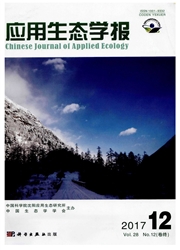

 中文摘要:
中文摘要:
根据1997~2000年东海23°30′~33°N、118°30′~128°E海域4个季节海洋调查资料,对东海浮游桡足类普通波水蚤(Undinula vulgaris)自然种群特征与环境的关系进行研究,并与1979~1980年资料进行比较.结果表明,普通波水蚤优势度、平均丰度、出现频率和占浮游桡足类总丰度的百分比均有显著的季节变化,其中秋季分别为0.09、556 ind·100m^-3、93.69%和9.90%,夏季为0.03、86ind·100m^-3、68.49%和4.08%,冬季为0.02、42ind·100m^-3、53.85%和3.80%,春季为0.01、16ind·100m^-3、34.35%和2.31%.普通波水蚤在东海的优势性主要表现在秋季.与20年前同海域研究结果相比。近年春、夏和秋3季普通波水蚤在东海浮游桡足类中的重要性有所降低,而冬季有所增加.冬季的增加可能与全球气候变暖相关.底层水环境变化是影响普通波水蚤种群数量分布的主要因子,说明该种数量变化与暖流势力有密切关系.普通波水蚤对沿岸水团和低温环境敏感,其高丰度分布区是暖流位置的良好指示.作为秋季东海重要的桡足类浮游动物,普通波水蚤在东海海洋渔业中有重要意义.
 英文摘要:
英文摘要:
Based on the data of four seasonal oceanographic censuses in 1997-2000 in the East China Sea (23°30′~33°N、118°30′~128°E), this paper discussed the relationships between the ecological characters of natural Undinula vulgaris population and its environment in the Sea, with the data of 1979-1980 compared. The results showed that there was a very clear seasonal change of the dominance, abundance, and occurrence frequency of U. vulgaris, i. e., autumn (0.09,556 ind·100 m^-3 93.69 % ) 〉 summer (0.03,86 ind·100 m^-3, 68.49 % ) 〉 winter (0.02,42 ind·100 m^-3,53.85% )〉spring (0.01, 16 ind·100 m^-3 34.35% ).As a dominant species of pelagic copepods in the Sea, U. vulgaris showed its predominance mainly in autumn. The percentage of U. vulgaris in the total abundance of pelagic copepods was 2.31% in spring, 4.80 % in summer, 3.80 % in winter, and 9.90 % in autumn, while its occurrence frequency was the highest in autumn and the lowest in winter. Comparing the resuits of this study with the data of 1979- 1980, the importance of U. vulgaris in pelagic copepods in the Sea was decreased in spring, summer and autumn, but increased in winter, which might be related with the global warming in winter, The main environmental factors affecting U. vulgaris abundance were the bottom water factors that closely related with the warm current in the ocean, Because of its sensibility to low temperature and coastal water mass, U, vulgaris could be used as a good indicator of warm current, and, as a good food for fishes, this species plays an important role in marine fishing in the middle-south part of the East China Sea.
 同期刊论文项目
同期刊论文项目
 同项目期刊论文
同项目期刊论文
 Effect of global warming on the distribution of Lucifer intermedius and L. hanseni (Decapoda) in the
Effect of global warming on the distribution of Lucifer intermedius and L. hanseni (Decapoda) in the 期刊信息
期刊信息
